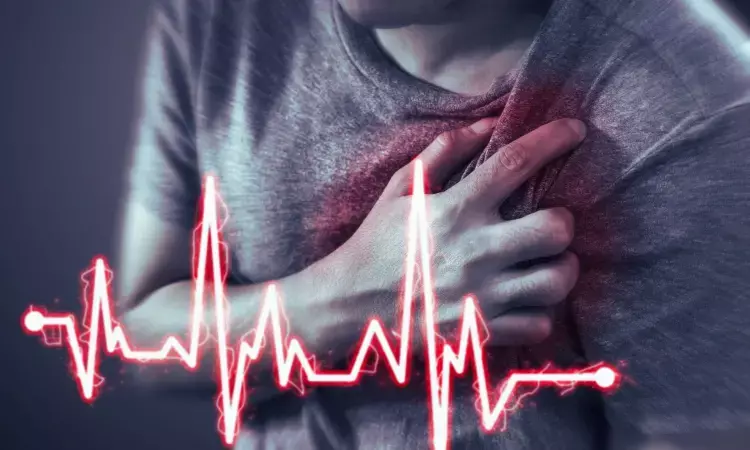- Home
- Medical news & Guidelines
- Anesthesiology
- Cardiology and CTVS
- Critical Care
- Dentistry
- Dermatology
- Diabetes and Endocrinology
- ENT
- Gastroenterology
- Medicine
- Nephrology
- Neurology
- Obstretics-Gynaecology
- Oncology
- Ophthalmology
- Orthopaedics
- Pediatrics-Neonatology
- Psychiatry
- Pulmonology
- Radiology
- Surgery
- Urology
- Laboratory Medicine
- Diet
- Nursing
- Paramedical
- Physiotherapy
- Health news
- Fact Check
- Bone Health Fact Check
- Brain Health Fact Check
- Cancer Related Fact Check
- Child Care Fact Check
- Dental and oral health fact check
- Diabetes and metabolic health fact check
- Diet and Nutrition Fact Check
- Eye and ENT Care Fact Check
- Fitness fact check
- Gut health fact check
- Heart health fact check
- Kidney health fact check
- Medical education fact check
- Men's health fact check
- Respiratory fact check
- Skin and hair care fact check
- Vaccine and Immunization fact check
- Women's health fact check
- AYUSH
- State News
- Andaman and Nicobar Islands
- Andhra Pradesh
- Arunachal Pradesh
- Assam
- Bihar
- Chandigarh
- Chattisgarh
- Dadra and Nagar Haveli
- Daman and Diu
- Delhi
- Goa
- Gujarat
- Haryana
- Himachal Pradesh
- Jammu & Kashmir
- Jharkhand
- Karnataka
- Kerala
- Ladakh
- Lakshadweep
- Madhya Pradesh
- Maharashtra
- Manipur
- Meghalaya
- Mizoram
- Nagaland
- Odisha
- Puducherry
- Punjab
- Rajasthan
- Sikkim
- Tamil Nadu
- Telangana
- Tripura
- Uttar Pradesh
- Uttrakhand
- West Bengal
- Medical Education
- Industry
Ultra-Short-Term Heart Rate Fluctuations Key Predictors of Sudden Cardiac Death, suggests study

Finland: Recent research has revealed that ultra-short-term fluctuations in heart rate can serve as a significant predictor of sudden cardiac death (SCD), offering new hope in identifying at-risk individuals. The study, which focuses on a specific heart rate measurement known as DFA2 α1, was conducted to assess its effectiveness in predicting SCD, particularly among patients at rest.
"Ultra-short-term DFA2 α1, when assessed at rest, is a strong and independent predictor of SCD. Additionally, the relationship between DFA2 α1 and SCD is influenced by levels of physical exertion," the researchers wrote in JACC: Clinical Electrophysiology.
Sudden cardiac death remains a leading cause of mortality worldwide, often occurring without warning, making early detection critical. Traditional measures of heart rate variability have demonstrated only weak links to sudden cardiac death. In contrast, detrended fluctuation analysis (DFA), enhanced by new methodological advancements for assessing the short-term scaling exponent, offers a potentially more effective approach than standard HRV methods.
Against the above background, Jussi A. Hernesniemi, Heart Hospital, Tampere University Hospital, Tampere, Finland, and colleagues investigated the relationship between DFA and sudden cardiac death.
For this purpose, the researchers examined the predictive capability of ultra-short-term heart rate fluctuations—specifically, 1-minute electrocardiogram samples—using detrended fluctuation analysis (DFA) both at rest and during various levels of physical exertion. The study involved 2,794 participants from the prospective FINCAVAS (Finnish Cardiovascular Study) who underwent clinical exercise testing.
The primary variable of interest was the novel DFA measure, the short-scale scaling exponent computed with second-order detrending (DFA2 α1).SCDs were identified according to the criteria set by the American Heart Association and the European Society of Cardiology, utilizing death certificates that included detailed accounts of the incidents.
The study led to the following findings:
- During a median follow-up of 8.3 years (ranging from 6.4 to 10.5 years), 83 cases of sudden cardiac death (SCD) were recorded.
- The resting measurement of DFA2 α1 showed a strong link to the risk of SCD, with lower values associated with a 2.4-fold increase in risk (ranging from 2.0 to 3.0), which was statistically significant. This relationship remained strong even after accounting for other key risk factors such as age, existing cardiovascular conditions, cardiorespiratory fitness, heart rate changes, and left ventricular ejection fraction.
- Traditional HRV measurements, whether taken during exercise or at rest, showed weaker and statistically insignificant associations with SCD once these other risk factors were considered.
The findings from the prospective study of patients undergoing clinical exercise testing indicate that a new approach to measuring heart rate variability—derived from just a 1-minute ECG signal—is a highly reliable predictor of sudden cardiac death, regardless of cardiorespiratory fitness, left ventricular ejection fraction, or other significant risk factors for SCD.
Reference:
Hernesniemi, J. A., Pukkila, T., Molkkari, M., Nikus, K., Lyytikäinen, L., Lehtimäki, T., Viik, J., Kähönen, M., & Räsänen, E. (2024). Prediction of Sudden Cardiac Death With Ultra-Short-Term Heart Rate Fluctuations. JACC: Clinical Electrophysiology, 10(9), 2010-2020. https://doi.org/10.1016/j.jacep.2024.04.018
Dr Kamal Kant Kohli-MBBS, DTCD- a chest specialist with more than 30 years of practice and a flair for writing clinical articles, Dr Kamal Kant Kohli joined Medical Dialogues as a Chief Editor of Medical News. Besides writing articles, as an editor, he proofreads and verifies all the medical content published on Medical Dialogues including those coming from journals, studies,medical conferences,guidelines etc. Email: drkohli@medicaldialogues.in. Contact no. 011-43720751


